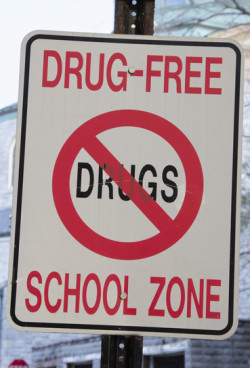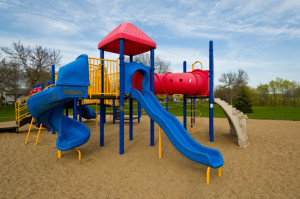Drug Free Zones in Texas

There are locations within Texas designated as Drug Free Zones. Simply stated, these are areas in which it is illegal to possess drugs or controlled substances. You may be thinking that it is already illegal to possess drugs in Texas so why have the Drug Free Zones. The Drug Free Zones allow the State to increase the penalty or punishment range for possession of drugs within 1,000 feet of the excluded zones.

Where are Drug Free Zones?
Drug Free Zones are areas that are frequented by children. Schools and daycares are some of the most common Drug Free locations, but there are many others. The Texas Health and Safety Code Section 481.134 has outlined a number of places that Drug Free Zones. Illegally possessing drugs within 1,000 feet of these zones can result in a higher degree of offense and range of punishment than just possessing the drugs anywhere else.
These Drug Free Zones include:
- Institutions of higher education (colleges or universities)
- Agency of Higher Education
- Education Affiliated Agencies
- Museums
- Public playgrounds
- Schools (public or private)
- Video arcade
- Youth center (can include a daycare center)
- Public swimming pool
- On a school bus.
What happens if I’m caught with drugs in a Drug Free Zone?

Metal bar door and cell in a prison
Possession of illegal drugs within the Drug Free Zone serves as an enhancement to the offense and increases the range of punishment by one degree for possession of drug charges. An example of this would be Possession of a Controlled Substance, Penalty Group 1 (methamphetamine), One Ounce to Four Ounces is a Third Degree Felony with a punishment range of 2-10 years in prison. If a person is accused of possessing the same drug of the same amount within a Drug Free Zone, the offense can be charged as Second Degree Felony with a punishment range of 2-20 years in prison.
Other Harsh Penalties for Drug Free Zone
In addition to the enhanced punishment an accused can face, a Drug Free Zone allegation in the indictment can affect the award of good conduct time and parole if someone is sentenced to prison. Subsection (h) of the law provides that if an accused is convicted of an offense under the Drug Free Zone that offense may not run concurrently with punishment for another conviction under another statute. The punishments will be stacked. For example, if an accused is convicted of Possession of Cocaine 1-4 grams in a Drug Free Zone and received a 5 year prison sentence and was also convicted of Burglary of a Habitation and received a 5 year prison sentence, the accused would be require to serve out the Drug Free Zone sentence BEFORE beginning to serve the Burglary sentence, effectively serving a 10 year sentence.
Many times the accused is not even aware that they are in a Drug Free Zone. The locations designated as Drug Free are not routinely marked with ‘Drug Free Zone’ signs making it unfair at times if someone is alleged to be in possession of a controlled substance within the zone. It is even possible to simply be driving through a Drug Free Zone and be stopped by police and charged with a Drug Free Zone allegation. If you or someone you know are facing a Drug or Possession of Controlled Substance charge it is critical that you consult with an experience Fort Worth criminal defense lawyer. Many times a skilled Fort Worth criminal defense lawyer can get the state to drop or waive the Drug Free Zone enhancement.
Drug Possession Attorneys in Fort Worth, TX
Cody Cofer

Lauren Crisera

Definitions for Texas Drug Free Zones
Institution of higher education is a public or private technical institute, community college, two-year college, four-year college, public university, private university, medical school, or dental school.
Agency of Higher Education includes administrative facilities of the: University of Texas System; Texas Western University Museum; Texas A&M University System; and Texas State University System.
Education Affiliated Agencies including the: Texas Agricultural Experiment Station; Texas Agricultural Extension Service; Texas Engineering Experiment Station; Texas Engineering Extension Service; Texas Forest Service; Water Resources Institute of Texas; and Texas Veterinary Medical Diagnostic Laboratory.
Certain Museums that include: Texas Tech University Museum; Sam Houston Memorial Museum; and Panhandle-Plains Historical Museum.
Playground is any non-school outdoor facility that is intended for recreation, is open to the public, and has 3 or more play stations intended for children (i.e. slides, swing, and teeter-totters).
School is considered a private or public elementary or secondary school or a day-care center.
Video arcades are places open to the minors and is intended primarily for the use of “pinball or video machines” and has at least 3 “pinball or video machines.”
Youth Center is a recreational facility or gymnasium intended for minors and “regularly provides athletic, civic, or cultural activities.”
Fort Worth Criminal Defense Attorneys
Fort Worth, TX 76102
Phone: 817-810-9395


















